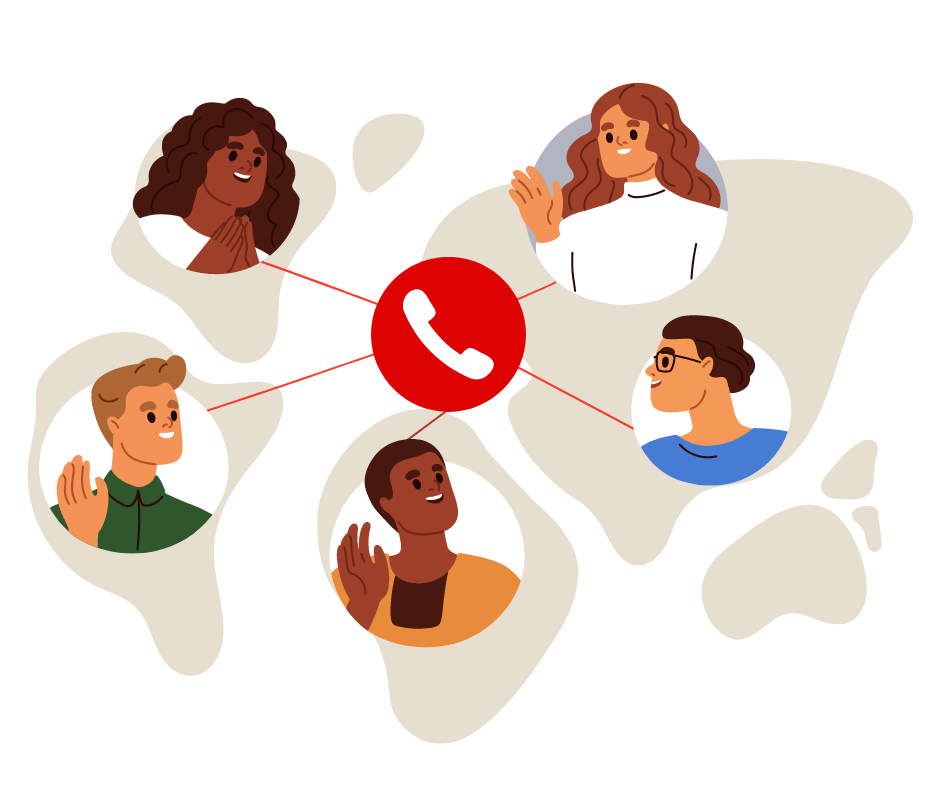RESOURCES
Telehealth Resources
Getting Started
Click on each item to expand the content.
Telehealth vs. Telemedicine vs. Telebehavioral Health: Definitions

Telehealth: The broad use of electronic information and communication technologies to provide remote healthcare services including provider training, continuing medical education, public health education, administrative meetings, and electronic information sharing to help with clinical management and support of patients.
Telemedicine: A subset of telehealth that entails provision of clinical healthcare services such as remote consultation, diagnosis, and treatment remotely without the need of in-person visits.
Telebehavioral Health: A subset of telehealth with emphasis on provision of mental health and substance use treatment services such as therapy, psychiatric evaluations, and counseling, through remote telecommunication.
Telehealth Community Engagement

To engage diverse community stakeholders in ways to advance school-based telemedicine and promote broad community supports for families.
- Recruit and retain wide range of family and child-serving system representatives to inform project activities, reinforce collaborative efforts, identify community resources, and work toward sustainability.
- Utilize broad community advisory group for input with ongoing and emergent concerns related to the school-based telemedicine services.
- Hold full group engagement meetings at least twice each year, with subcommittee meetings based on specific goals/deliverables with options to meet in person or via telehealth.
- Promote two-generation perspectives and gather resources from broad groups (e.g., housing, employment, TANF, education, adult healthcare) to build a supportive environment for the student receiving telehealth services.
- Explore community priorities through the CHA/CHIP and other needs assessment processes in order to identify additional potential services using school-based telemedicine, including asthma, oral health, diabetes management, concussion and other supports.
Telemedicine Services and Support

Following telemental health best practices, increase evidenced-based assessment, treatment, and adherence interventions for behavioral health and obesity.
- With school site and advisory group input, adapt telemedicine protocols across assessment, treatment and adherence for the range of behavioral health and obesity intervention with school-age population (K-12).
- Provide training and ongoing support to telemedicine coordinators and telefacilitators, including opportunities to shadow existing telefacilitators.
- Complete monthly videoconferencing calls among the telemedicine coordinators and telefacilitators to encourage “lessons learned”; invite speakers based on regional sites’ interests and needs.
- Provide evidenced-based telemedicine assessment, treatment and adherence interventions.
- Across key groups (families, rural personnel, providers), complete process measures associated with treatment over telemedicine, consistent with RE-AIM evaluation framework.
- Gather follow-up information across participating sites concerning barriers and facilitators, then seek additional behavioral and obesity services along with other pediatric services via telemedicine to meet the needs.
- Explore expansion of telemedicine services to support two generation health needs
Distance Education and Mentoring for Telemedicine

Utilizing a range of distance education delivery approaches including Project ECHO, increase mentoring continuing education and opportunities for school-based telemedicine personnel.
- Complete ongoing need assessment with school-based health center and broader school personnel to identify educational topics of interest.
- Adapt behavioral and obesity management curriculum.
- Complete ECHO accreditation for educational credits including CME (Continuing Medical Education), CNE (Certified Nurse Educator), and CE (Continuing Education).
- Train the hub team in the ECHO telementoring approach, including completion of a “mock” ECHO.
- Train spoke sites in the ECHO approach and provide case templates for the de-identified case presentations.
- Complete bi-monthly ECHO sessions and archive content for review, and evaluate.
Telehealth Obesity Prevention Program

To adapt the 12345 Fit-tastic healthy weight collaborative approach for the rural Kansas audience and use telehealth to implement across rural school partners.
- Adapt and continuously improve the Fit-tastic collaborative approach and materials for the rural setting, drawing on input from the advisory group and experts in obesity, school-based services and rural health.
- Recruit, support, and retain Fit-tastic teams from the target rural schools and their communities.
- Liaise with pediatric obesity experts to provide telehealth presentations and support (the two) cohorts using videoconferencing.
- Implement Fit-tastic distance educational events, including the broader community educational events.
- Ongoing retention efforts and data collection from internal team personnel and from collaborative teams.
- Provide ongoing technical support, both in person and by video, around quality improvement strategies.
Telehealth Workforce Development

To support student participation in Telehealth ROCKS Schools activities across the workforce pipeline.
- Recruit health professional trainees to participate across project activities: Engagement, Services, Education/Mentoring, and Prevention.
- Gather feedback from trainee experiences and continue to improve the telemedicine experiences.
- Participate in AHEC (Area Health Education Centers) health careers promotions activities around the behavioral health and obesity intervention careers, emphasizing telehealth.
Telehealth/Telebehavioral
COVID-19 Heartland Telehealth Resource Center
- Link to recent updates in state and federal policies on telehealth reimbursement, webinars and funding opportunities in Kansas/Missouri/Oklahoma
Telebehavioral Health Center of Excellence
- Link to the most current, vetted, practical info for starting/enhancing Telebehavioral or Telemental health-related services
Indian Health Services - Telebehavioral Health Center of Excellence
- Link to information about the health program for American Indians and Alaska Natives
American Academy of Pediatrics - Getting Started in Telehealth
- Link to a variety of telehealth applications can be leveraged by a pediatric medical home
American Psychological Association
- Guidelines for the Practice of Telepsychology
American Psychiatric Association
- Link to Telepsychiatry Toolkit
Center for Disease Control and Prevention
- Link to the Use of Telehealth and Telemedicine in Public Health
- Article outlining Six ways to find balance and stay connected
For Parents/Families
Children's Hospital of Philadelphia - Health Care Toolbox
- Link to resources to address psychological and emotional impact of COVID-19 pandemic on children, families, and healthcare staff
- Link to resources and daily tips to parents during COVID-19
Centers for Disease Control and Prevention
- Link to variety of tips for daily life and coping during this pandemic
Self Advocacy Information - English version
- Downloadable PDF of plain language information with visual aids on COVID-19 in English version
Self Advocacy Information - Spanish version
- Downloadable PDF of plain language information with visual aids on COVID-19 in Spanish version
National Association of School Psychologists
- Link to resources and podcasts for guidance and support
St. Jude Children's Research Hospital
- Free coloring and activity books on COVID-19 for kids
- Downloadable PDF of visual aids to explain social distancing to children
American Academy of Child & Adolescent Psychology
- Link to compiled resources for parents, patients, and clinicians
National Center for Pyramid Model Innovations
- Link to a variety of resources in helping children and families cope with emergencies and natural disasters
The National Child Traumatic Stress Network
- Informational handout for guiding parents and caregivers to helping their families cope during COVID-19
Self Advocacy Resource and Technical Assistance Center (SARTAC)
- Link to a variety of resources (e.g., handouts, visual aids, forms, etc.) that are helpful during COVID-19
Autism Focused Intervention Resources and Modules
- Toolkit in supporting individuals with autism through uncertain times
Center on the Developing Child at Harvard University
- Article about stress, resilience, and the role of Science in responding to the COVID-19 pandemic
The University of Kansas Health System
- Link to updates of guidelines for visiting the health system, temporary service changes, tips, and etc.
- Link to tips for families during the pandemic
For Health Care Professionals
- One-page handout for COVID-19
Philippines Association of Speech Pathologists - English version
- Downloadable PDF communication boards for those who are temporarily unable to speak in English version
COVID-19 Heartland Telehealth Resource Center
- Link to recent updates in state and federal policies on telehealth reimbursement, webinars and funding opportunities in Kansas/Missouri/Oklahoma
Kansas Department of Health and Environment
- Link to a variety of resources about COVID-19 in the state of Kansas
National Association of School Nurses
- Link to of resources for school nurses
United States Department of Veterans Affairs - National Center for PTSD
- Article to managing healthcare workers' stress associated with the COVID-19 Outbreak
Association of Psychologists in Academic Health Centers
- 2-page handout of telehealth tips in managing suicidal clients during the COVID-19 Pandemic
American Psychological Association
- List of new articles throughout the COVID-19 Pandemic
- List of resources on how rural response to Coronavirus Disease 2019
University of Kansas-Medical Center - A.R. Dykes Library
- Scientific literature resources on COVID-19
The University of Kansas Health System
- Link to updates of guidelines for visiting the health system, temporary service changes, tips, and etc.
Psychology Tools - Living with worry and anxiety amidst global uncertainty
- A self-guided packet for managing anxiety during uncertain times like Covid-19
Children's Hospital of Philadelphia - Health Care Toolbox
- Link to resources to address psychological and emotional impact of COVID-19 pandemic on children, families, and healthcare staff
For Educators
National Association of School Psychologists
- Link to resources and podcasts for guidance and support
Philippines Association of Speech Pathologists - English version
- Downloadable PDF communication boards for those who are temporarily unable to speak in English version
Kansas Department of Education
- Link to information and resources for schools and school personnel
Individuals with Disabilities Education Act
- Link to questions and answers providing services to children with disabilities during COVID-19
- Link to tips for families during the pandemic
National Association of School Nurses
- Link to of resources for school nurses
Video Resources Developed by KU LEND Postdoctoral Researchers
Supporting Yourself and Your Child During COVID-19
Helping Your Preschool-age Child Cope
